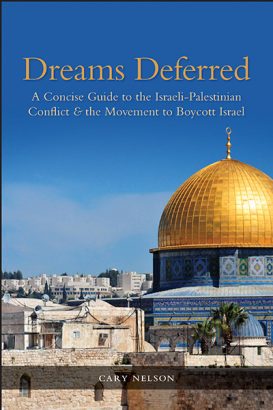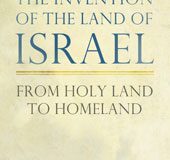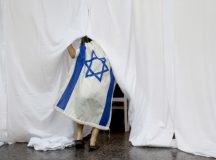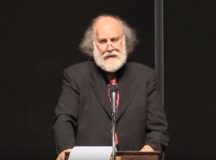I tried to read Dreams Deferred in the conventional style, cover to cover. Bad idea. The book isn’t best read like that. Reading it cover-to-cover you can get a bit disorientated by changes of writing style and constant reiteration of similar points, and jumping from topic to topic as they are set out in alphabetical order.
That’s because it is intended to be read more like an encyclopedia or manual, and when tackled like that it works. It’s a series of short essays, each between four and ten pages or so in length, and each tackling a different aspect of the BDS (Boycott, Divestment and Sanctions) movement, and the ideology, rival narratives and analysis of the Israeli-Palestinian conflict that sit behind it and the arguments against it.
It actually owes its structure to the way a website is set out, with different essays cross-pointing to linked subject areas and further reading, and this is reflected in the simultaneous launch of a website called Israel and the Academy, which includes a wide range of additional supporting materials.
If you read the book by dipping into it and starting with the essay that most interests you, then following the recommended additional reading at the end of the essay, it works remarkably well. (1980s kids who grew up playing ‘Fighting Fantasy’ novels structured along the lines of ‘to go into the dungeon turn to page 26, to fight the Orc, go to page 100’ will be at home with the format.)
This also makes the book work from a practical, campaigning point of view. You could read the whole thing and gain a good grounding in every aspect of the extensive set of arguments. Or, if you are a student union activist hurriedly prepping for a debate on a motion condemning ‘pinkwashing,’ for instance, you can just dip in and read that specific four page essay.
Cary Nelson has managed to persuade a stellar cast of 25 academically credible writers to contribute essays. Most of the people who are seriously thinking about the intellectual case against BDS and anti-Zionism are in on this project. The quality of the prose is great and so is the level of historical and contemporary knowledge of Israel displayed therein.
The book manages to be both rigorous enough to stand up to academic scrutiny and punchy and polemical enough to be of practical use to campaigners. This is important given that it is clearly aimed at campus audiences, which is one of the key arenas in the battle over BDS in both the UK and the US. I sense that it would be equally useful as a primer for students and a thought-provoker for academics.
Particularly useful is the way the book interrogates and debunks key concepts that sit behind the anti-Zionist ideology, rather than shying away from them. It gets right into the anti-Zionist’s side of the chess board and takes the debate deep into their territory. A good example is Nelson’s own essay (including a chunk of material from Ilan Troen) on ‘Settler Colonialism,’ which takes a really effective swipe at the application of this concept to Israel.
All the key concepts that one might encounter in this debate are here, from the Nakba to the apartheid smear to proportionality in asymmetric warfare to Holocaust Inversion. It’s quite an achievement to tackle such a wide range of topics, each of which could easily fill a short book.
The overall tone is a progressive Zionist one, with constant references to the need for the two-state solution and emphasis of the rights of the Palestinians. This is appropriate as the debate about BDS is primarily one waged between rival sets of progressives within progressive civil society institutions.
My one criticism would be that the book feels very much a product of its milieu – North American campus life. Even though there are contributions from a few British academics like David Hirsch and Fathom’s Alan Johnson, the overall balance and style are very American and inevitably get bogged down in concepts like intersectionality, which are central to radical campus debate but lack traction in wider society. Similarly it feels like it is written from a perspective where campus is the crucial battleground over BDS, whereas I would see it as just one civil society battleground alongside others like trade unions, political parties, churches, local government and the arts and culture. So for instance, an obscure US academic network, the American Anthropological Association, gets an eight page essay, whilst the entire phenomenon of BDS in trade unions (or as the book calls them ‘organised labour’) gets five pages, with just half a page covering BDS in non-US unions, and with the UK National Union of Students (NUS) conflated into the couple of sentences about trade unions (NUS isn’t one trade union, it’s a confederation of campus student unions). Cultural boycotts get four pages. BDS in the churches and all the associated theological debate gets seven.
I suppose it is inevitable that academics will give disproportionate weight to what they encounter and can directly react to day-to-day among their colleagues and their students on campus, and I understand that campus is disproportionately important as it is the incubator for changes in ideas and ideology and the place where future political leaders develop their ideas. But it worries me that this creates an ‘ivory tower’ approach and means there is less being studied and written about BDS and delegitimisation in other spheres that are less easy for academics to study first hand. I fear that some of those arenas and bodies can have far more impact on Israel’s reputation. For instance in the UK, it is distressing for Jewish students and their parents if NUS has a BDS policy, but its impact on wider public life is low as most British citizens expect students to take bizarrely radical stances on foreign policy (they have been since at least the 1930s), whereas if the Methodist Church, or the Unite trade union, or Leicester City Council, pass BDS policies, then these are large, serious organisations with reach into wider UK society, who help propagate the concept of BDS and legitimise delegitimisation of Israel among sections of the UK public far beyond the radical left.
With this caveat – and maybe it’s my problem and I need to write a book about BDS in these areas of British society – I recommend Dreams Deferred. It will make a fine addition to the bookshelf of any progressive opponent of BDS, and will become a well-thumbed one, as there are plenty of essays here that will be regularly referred to whilst this pernicious debate rumbles on.






































